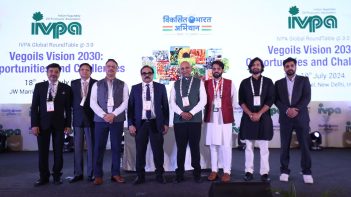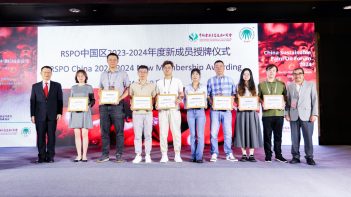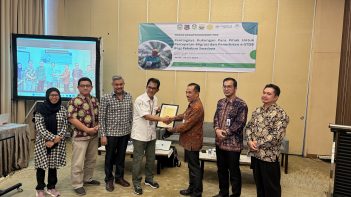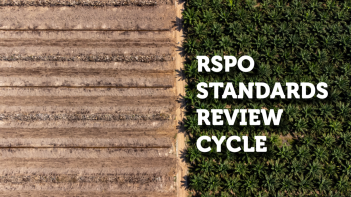6 million metric tonnes of RSPO CSPO marked by world’s leading producer of certified sustainable palm oil, NBPOL
Kuala Lumpur, Malaysia, 22 May 2012 – Public listed New Britain Palm Oil Limited (NBPOL; LSE: NBPO) pledged to have all its palm oil mills 100% RSPO-certified by the end of 2012, through fully traceable, segregated, sustainable palm oil.
As top five producer of RSPO Certified Sustainable Palm Oil (CSPO) in both production volume and area, NBPOL recently enabled the Roundtable on Sustainable Palm Oil (RSPO) to achieve the mark of 6 million metric tonnes of CSPO through the latest certification of its mill in Poliamba, Papua New Guinea (PNG). NBPOL is based in West New Britain Province, Papua New Guinea – a new frontier that is rapidly setting global benchmarks in terms of both productivity and innovation.
Darrel Webber, Secretary General of RSPO, comments: “We commend and applaud NBPOL for their leadership, contribution and dedication towards embracing and promoting best practices in sustainable palm oil. This landmark achievement in PNG, a significant growing palm oil market encourages us to continue our vision and global effort in the production of sustainable palm oil according to good environmental, social and economic standards.
“7% of annual production capacity is contributed by PNG, which makes it the 3rd largest CSPO producer in the world after Indonesia and Malaysia. Approximately 30% of the oil palm growers in PNG comprise smallholders. This is also a great development for Europe, NBPOL’s main market, as the region will benefit from being able to source fully segregated sustainable palm oil contributing over time towards the growth in the overall uptake of CSPO.” Webber further commented.
Nick Thompson, Chief Executive of New Britain Palm Oil Limited discussed the company’s announcement: “Through our public undertakings to have all our palm oil mills 100% RSPO-certified by end of 2012, this further underlines New Britain Palm Oil’s commitment to sustainable business practices. We believe that fully committing to and implementing these practices will not only drive the sustainable growth of our business and create value for our investors, customers, and wider stakeholders but also ensure that we best serve and advance the rural communities within Papua New Guinea and the Solomon Islands.”
RSPO works closely with the PNG Palm Oil Council in order to ensure that local growers are supported with implementing the RSPO Principles & Criteria. Ian Orrell of the PNG Palm Oil Council underlines the importance of having all parties along the palm oil supply chain on board: “In order for Papua New Guinea to further build on its global reputation as a notable and successful supplier to the sustainable palm oil market, the PNG Palm Oil Council supports large companies and smallholders alike to become RSPO-certified. By facilitating, coordinating and promoting sustainable palm oil in Papua New Guinea, the Palm Oil Council brings together palm oil producers, smallholders, government, as well as public sector bodies and civil society. Our ultimate goal is that all palm oil produced in Papua New Guinea will be certified sustainable palm oil.”
About the 2011 RSPO CSPO Growth Interpretation Narrative (2011 GIN)
The latest 2011 RSPO CSPO Growth Interpretation Narrative (GIN), the first and only report in the market on certified sustainable palm oil aimed at analyzing, shaping and facilitating commitment and discussion towards sustainable palm oil – reported the upward trend in the supply and sale of sustainable palm oil and is available on: https://rspo.org/en/home. A summary of quick facts is also available on: https://rspo.org/wp-content/uploads/QUICKFACTS-APR12-1pdf
About RSPO
In response to the urgent and pressing global call for sustainably produced palm oil, the Roundtable on Sustainable Palm Oil (RSPO) was formed in 2004 with the objective of promoting the growth and use of sustainable oil palm products through credible global standards and engagement of stakeholders. The seat of the association is in Zurich, Switzerland, while the secretariat is currently based in Kuala Lumpur with a satellite office in Jakarta.
RSPO is a not-for-profit association that unites stakeholders from seven sectors of the palm oil industry – oil palm producers, palm oil processors or traders, consumer goods manufacturers, retailers, banks and investors, environmental or nature conservation NGOs and social or developmental NGOs – to develop and implement global standards for sustainable palm oil.
Such multi-stakeholder representation is mirrored in the governance structure of RSPO such that seats in the Executive Board and project level Working Groups are fairly allocated to each sector. In this way, RSPO lives out the philosophy of the "roundtable" by giving equal rights to each stakeholder group to bring group-specific agendas to the roundtable, facilitating traditionally adversarial stakeholders and business competitors to work together towards a common objective and making decisions by consensus.
– End –
Contact for RSPO Secretariat:
Anne Gabriel, Communications Director | T:+603-22012053 | [email protected]
Contact for Europe:
Giovanni Colombo, Hill+Knowlton Strategies | T: +32 (0)2 231 50 19 | [email protected] ; [email protected]
Contact for Indonesia:
Desi Kusumadewi, RSPO Indonesia Director | T: +62 21 5794 0222 | [email protected]
Contact for India:
Arneeta Vasudeva, IPAN Hill & Knowlton | T: +91-124-4967316 | avasudeva@ipanhillandknowlton.com
Contact for China:
Peter Headden, Hill & Knowlton | T: (86 10) 5861 7597 | [email protected]
Keep reading

Save the Date: The 21st General Assembly (GA21) of RSPO Members
Interim Measure for Requirements 5.1.5 and 5.1.6 of RSPO Rules on Market Communication and Claims 2022

RSPO Partners with Indian Vegetable Oil Producers’ Association (IVPA) to Promote Sustainable Cultivation and Palm Oil Imports in India
Call for Expression of Interest: Independent Investigation of a Complaint

2024 China Sustainable Palm Oil Forum Calls for Bold Action on Supply Chain Sustainability
Reminder: Important Updates on Shared Responsibility

Smallholder Inclusion in Indonesia: Over 1,000 Farmers Registered in RSPO Pilot Districts




